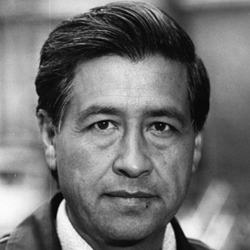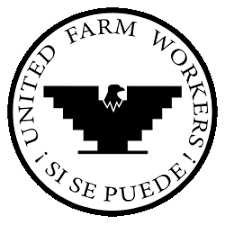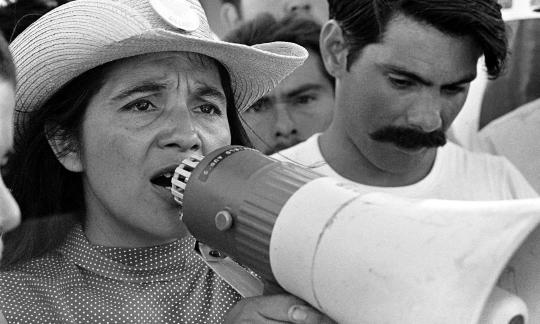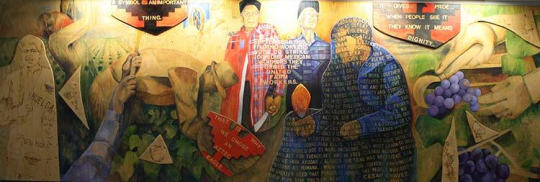Honoring the Legacy of Cesar E. Chavez

It has been 10 years since President Barack Obama signed a Presidential Proclamation declaring March 31, Cesar E. Chavez Day. Five years before Chávez died, at the age of 61, he undertook his third hunger strike to protest the dangers of pesticides for farmworkers and their children– his hunger strike lasted 36 days.
Chavez's resilience and commitment to improving the working conditions and wages of farmworkers are just as important today. The COVID-19 pandemic has highlighted the inequities that farmworkers experience. Farmworkers feed our nation by bringing vegetables, fruits, and dairy products to our tables. They are the lifeblood of our country, and especially our state’s economy. As essential workers, they’ve continued working under conditions ripe for COVID transmission, despite glaring disparities in access to health care and health outcomes. This makes César E. Chávez Day, a celebration of one of America's greatest champions for social justice, all the more important to recognize his and our collective mission for correcting injustice. The Office of Diversity, Equity, and Inclusion remembers César E. Chávez’s resilience in his mission to show that every job, every worker, every person, has value.

Who was Cesar E. Chavez?
Cesar E. Chavez (March 31, 1927 – April 23, 1993) was born to Mexican American migrant laborers in Yuma, Arizona. After dropping out of school after the eighth grade, Chavez began working in his parent's general store and tending to the family farm on land cultivated by his grandfather. In 1962, Chavez began organizing and became a prominent leader championing farmworkers’ rights and civil liberties for Mexicans and Mexican-Americans. Chavez inspired farm laborers and millions of people to commit themselves to social, economic, and civil rights activism. After dying in his sleep on April 23, 1993, the following year, President Bill Clinton awarded him a posthumous Presidential Medal of Freedom, the nation’s highest civilian award.
Cesar E. Chavez’s Legacy
In the early 1950s, Chavez was influenced and inspired by prominent leaders like Father Donald McDonnell, Mahatma Gandhi, and Dr. Martin Luther King Jr. He credits them with educating him about social justice, human rights, civil disobedience, and activism. In 1962, Chavez and community organizer Dolores Huerta founded the National Farm Workers Association (NFWA) in Delano, California.
The Delano Grape Strike of 1965 was initiated by a mostly Filipino-American farm laborers group, who were protesting against local table grape growers for failing to honor an agreed-upon increase in worker wages. This protest was a pivotal moment that gained the attention of Chavez, who sprang into action, calling for consumer grape boycotts, garnering support from churches, civil rights groups, and other unions. Chavez led a 340-mile march from Delano to Sacramento in 1966 and undertook a well-publicized 25-day hunger strike in 1968, as part of a nationwide boycott of California grapes because of the small pay and poor work conditions agricultural laborers were forced to endure.

Soon after, the NFWA became known as the United Farm Workers (UFW). Chávez and Huerta led the UFW for more than three decades, achieving fair wages, medical coverage, and pension benefits for hundreds of thousands of farmworkers.
Dolores Huerta’s Legacy – “Si se puede!” (“Yes, it can be done!”)

Dolores Huerta is a vital activist in American history and was an equal partner in co-founding the first farmworker union with Cesar Chavez. Dolores led the fight for racial and labor justice alongside Chávez. She was also instrumental in the enactment of the Agricultural Labor Relations Act of 1975. This was the first law of its kind in the United States, granting farm workers in California the right to collectively organize and bargain for better wages and working conditions. In 2012 President Obama awarded Dolores, The Presidential Medal of Freedom.
Tiene la Lumbre por Dentro/He has the Fire Within Him: SSU César E. Chávez Memorial
The University Library at SSU is home to the Cesar E. Chavez Memorial, created by artist and Philippines native Johanna Poethig. Understanding the history of the United Farm Workers, she included the Filipino farmworker struggle in the mural’s center. The mural also features a unique technique incorporating both painting and burning on wood. The line of people burned into the wood at the front includes the faces of Dolores Huerta and Esther Chavez (César’s wife).

The mural reads: Con respeto, cariño y gratitud por sus incansables esfuerzos y sacrificio para lograr una vida digna y humana para los campesinos, dedicamos este monumento a Cesar Estrada Chavez.
Translation: With respect, love, and gratitude for his sacrifice and tireless efforts to attain a life of dignity and humanity for the farmworkers, we dedicate this memorial to Cesar E. Chavez.
SSU Reflections on Cesar E. Chavez Day
“Cesar Chavez Day reminds me of resistance and advocacy of education. Chavez resisted the constant pressure from those who opposed his ideologies gracefully and peacefully. While marching, protesting, and fighting legal battles, he always found a way to weave in a component of learning, which I find to be courageous for someone who couldn’t afford to continue his education past eighth grade.”
- First-Year Student Erika Diaz Ramirez, Computer Science

“Labor activist and community organizer Cesar Chavez spent his whole life advocating for better salaries and working conditions for poor workers in the United States. To honor his legacy, we need to address the current poverty and disenfranchisement of agricultural workers. We need Cesar Chavez’s spirit to advocate for change on behalf of migrant farmworkers. Though Chavez and his movement greatly improved the worker’s conditions, there is still much that needs to be done. We must fight to streamline the visa systems for migrant farmworkers and demand better pay and safer working conditions for all farmworkers, both US-born and immigrants, especially undocumented ones from Mexico.”
- Professor Daniel Malpica, Chicano and Latino Studies, Director of the McNair Scholars Program
Resources
- A Legacy of Service Virtual Video Series
- César E. Chávez Visits SSU - University Library Archives Collection
- César E. Chávez Foundation website
- Dolores Huerta Foundation website
- United Farm Workers
- Delano Manongs: Forgotten Heroes of the United Farm Workers Movement
- SSU Chicano and Latino Studies Department
- The Farm Workers Movement


